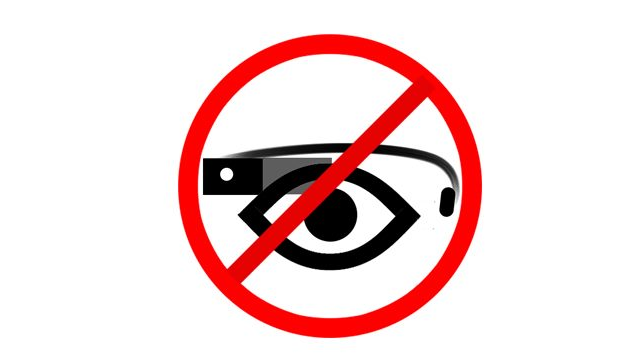
| Home | Title Page | Introduction | Background | Potential Benefits | Legal, Ethical, and Security Issues | Social Concerns | Further Required Research | Conclusion | References |
Legal, Ethical, and Security Issues
Google Inc. has had a couple of privacy implications about its Google Glass innovation. People have expressed their concerns about people wearing Google Glasses to record them without their consent. The glass can easily take pictures and record videos without someone else knowing. Tsukayama (2014) expresses this when she says that "if you pass by someone who is recording, or if you're not looking too closely at the wearer's face, it is a tricky thing to figure out." Even though it lights up when in use, it is hard for someone to know of what use the device is filming. Google is trying to counter this by educating its prototype testers of practicing good etiquette when using the glasses. Google has also been urged to avoid adding facial recognition technology to the glass. With the facial recognition software, whoever wears the glasses can easily identify people by taking a screen shot of their faces and running it through the software. This can easily reveal information about people without their consent. The identification of strangers in public without their consent is against the privacy rights. This drew the attention of the local and state lawmakers, making the company put restrictions of not adding the facial recognition software in their glasses. The device also has capabilities of recording private conversations. As long as it's within reach of what the other person is saying, the device can tap into conversations without the persons concerned knowing, which is another breach of the privacy rights, as enshrined in the Fair Information Practice Principles (FIPPS).
Google glasses made enemies with movie theaters and other areas where recording is banned. There have been disputes about the wearing of glasses in movie theatres where one may be restricted of filming, since they will be making illegal copies of the film. The legality of the glasses has been questioned in a number of countries, particularly Russia, Ukraine and other post-Soviet countries. These countries have strict laws regarding spy gadgets that can record videos, audio or take photographs in an inconspicuous manner. Its abilities of recording inconspicuously, have led it to be banned in various sectors even before it became available. This has largely been due to its privacy violation capabilities and strict laws in place. "Facilities, such as Las Vegas casinos, banned Google Glass, citing their desire to comply with Nevada state law and common gaming regulations that ban the use of recording devices near gambling areas" (Metz, 2014).
The security of glass users has also been questioned in case the device is stolen or lost. A user that has some private documents in the device can easily loose the information to a third party, information that can be used for malicious purposes. Google, however, are in the process of developing a locking system that will restrict unauthorized access to the device. The device also can be remotely reset to avoid tampering any important information in case it is stolen. Furthermore, being a costly device, security officers have lamented about the possibility of the device increasing the crime rates as muggers and robbers try to access it for profitable purposes. Cyber Forensic experts have also placed a red light against using the google glass due to its ability to steal smartphone and tablet passwords."The glass has a software program that can track finger shadows as someone types in their password, which then converts the tracked shadows into the keys they were touching, allowing them to catch the passcodes" (Arthur, 2013)
